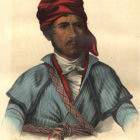Timpoochee Barnard: Yuchee Chief
Timpoochee Barnard, Yuchee Chief
born about 1783 in the Creek Nation, died in about near Fort Mitchell in Alabama; was the son of Timothy Barnard, who was the son of Captain John, commanding a company of rangers in Georgia, dying in that colony about 1768. Captain John Barnard may have been of Scotch birth, as possibly may have been the case with his son Timothy, who was born, conjecturally, about 1750. Timothy Barnard evidently received a fair education. He was an officer in a company of rangers in Georgia in 1773, and in the same year was appointed a justice of the peace with power to act on the lands, then recently ceded by the Creeks and Cherokees. He was also a trader among the Creeks and married a Yuchee woman, by whom he became the father of six sons and two daughters. The sons were James, who was a cripple, William, who married a daughter of Sullivan, an Indian trader. Timpoochee, Cuseene, who with his Indian wife emigrated to the Arkansas Territory, Michy and Buck. His daughters were Polly, who married Joe Marshall, and Matoya, who died single. Timothy Barnard was a Royalist during the American Revolution. His property was confiscated by the Georgia legislature and he himself was ban- ished from the State. From the meager ref erences attainable, he then made his home in the Creek Nation. It was perhaps about this time that his son Timpoochee was born. Tim- poochee is merely an Indian corruption of Timothy. In February. 1785, probably through the influence of Captain Patrick Carr, Timothy Barnard was relieved from the penalty of treason and permitted to return to his former home, there to enjoy and pos- sess every right of citizenship. Being now a thorough American, he was the deputy agent of the Lower Creeks in 1793 and 1794 and was one of the interpreters at the treaty of Coleraine in 1796. He died at an advanced age on Flint River, Georgia, the year not known. But little is known of the early life of Timpoochee Barnard. His mother care- fully taught him to speak her native Yuchee dialect, while no doubt he learned much Eng- lish from his father. Following the custom of his people, he also mastered the Muscogee dialect, as a knowledge of it was indispensa- ble in the public and private life of the Creek people. Timpoochee Barnard first became prominent in General Floyd’s campaign against the Creek Indians in January, 1814. He was commissioned major, and commanded one hundred Yuchee warriors. In the latter part of the night of January 2 7, the Creeks, in large force, made a furious attack on Gen- eral Floyd’s troops, who were encamped in Calebee swamp. Captain John Broadnax was in command of a detachment, stationed at some distance from the main army. The Creeks, discovering the isolation of the de- tachment, assailed it, surrounded it, and cut it off from the other troops. Major Barnard, taking in the situation, made a desperate on- set on the Creeks with his Yuchee warriors, drove them back and so opened a way for Broadnax’s men to join the main army. This heroic exploit gave Major Barnard a great name with the Americans. He continued to serve in the army with distinction until the close of the war. He was twice wounded. General Jackson, many years afterwards paid this high tribute to Major Barnard in a con- versation with his son William: “A braver man than your father never lived.” Major Barnard was present at the treaty of Fort Jackson, August 9, 1814, signing the treaty- as “Captain of the Uchees.” While no doubt a man of high military instincts, Major Barnard was domestic in his habits and devotedly attached to his family. He had six children, two of them girls, and they all had the reputation of being the handsomest chil- dren in the Creek Nation. His son, William, received a fair education, and in after years served in the Seminole war of 1835 under Paddy Carr. The military career of Major Barnard did not close with the Creek War. In 1818, in command of a band of Yuchee warriors, he served under his old commander, General Jackson, through the Seminole War of that year. He distinguished himself in the fight of April 12, 1818, at Econafflnnah or Natural Bridge, where was rescued Mrs. Stu- art, the only survivor of the massacre of Lieutenant Scott’s party on Apalachicola River, of November 30, 1817. Major Bar- nard was opposed to the treaty of the In- dian Springs, and was one of the delegation that went to Washington to protest against the validity of that treaty. After this event, he continued to reside his remaining years at his home near Fort Mitchell, blessed with all the wealth that was desirable, and noted for his public spirit, his hospitality and benevo- lence. Thus passed away a genuine man, that was an honor to the Indian race.
Bibliography. — McKenney and Hall’s Indian Tribes of North America (1854), vol. II, pp. 25-28; Pickett’s History of Alabama (Owen’s Edition, 1900) p. 585; White’s Historical Col- lections of Georgia (1855) p. 166; Woodward’s Reminiscences of the Creek or Muscogee In- dians (1859), pp. 54, 109; Handbook of the American Indians (1810), Part 2, p. 752.
